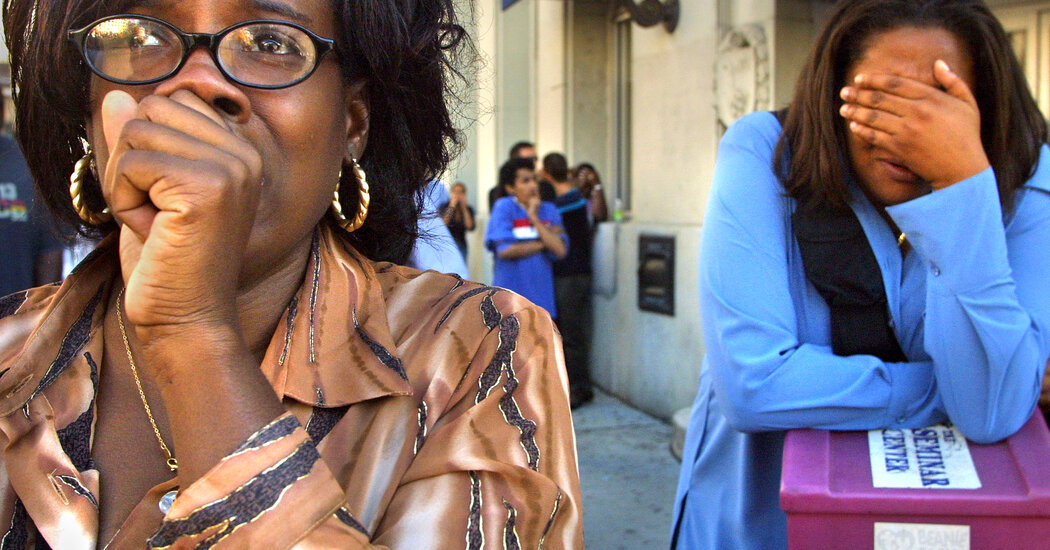Ever since insurrectionists invaded the Capitol, we’ve heard that Jan. 6 closed a chapter in American history. No longer should America’s most threatening enemies be understood as foreign — a euphemism for Muslim — but instead as domestic, a euphemism for primarily white Americans on the far right. “The ‘post-9/11’ era, where our greatest threats to national security were external, is over,” said Representative Elissa Slotkin, Democrat of Michigan and a former C.I.A. and Pentagon official.
But Jan. 6 is less a bookend to the Sept. 11 era than a manifestation of it.
The war on terror accustomed white Americans to seeing themselves as counterterrorists. Armed white Americans on the far right could assemble in militias, whether in Northern states like Michigan or on the southern border, and face little in the way of law-enforcement reprisal. Such impunity led to situations like one in 2016, recounted in a relatively rare criminal complaint, when members of a Kansas militia with the revealing name the Crusaders plotted to murder their Somali-American neighbors. “Make sure if you start using your bow on them cockroaches, make sure you dip them in pig’s blood before you shoot them,” one stated. They considered themselves to be doing what America was doing all this time: combating terrorism, since, as patriots, they couldn’t be committing terrorism.
As the foreign wars became disasters, the faction of the far right that became part of President Donald Trump’s MAGA coalition found itself less interested in the wars themselves than in civilizational violence. Many MAGA adherents applauded when Mr. Trump as a presidential candidate said he would “bomb the [expletive]” out of the Islamic State and called for the barring of Muslims from entering the country. According to the story told by Mr. Trump and his allies, American leaders of the intelligence agencies and the military were unwilling to unleash sufficient violence against sufficient Muslims, unwilling to close the borders, overly willing to conduct “nation-building and regime change” in unfamiliar countries and aligned with enemies like President Barack Obama, whom he suggested was a secret Muslim.
Skirmishes with the Washington, D.C., police ahead of the insurrection revealed how the insurrectionists saw themselves. “We’re the veterans!” one yelled. There were 22 people with military experience among the first 176 people charged with insurrection-related crimes. Ashli Babbitt, the MAGA martyr and a devotee of QAnon — a conspiracy theory that fantasizes about locking liberals up at Guantánamo Bay — deployed to Iraq and Afghanistan. But many others were just cosplay warriors, wearing body armor, helmets and hard-knuckle gloves, in emulation of those whom the war on terror had for 20 years valorized as the truest American heroes. “This is war,” a California yoga instructor participating in the insurrection allegedly declared.
The Sept. 11 era also manifested in the Biden administration’s reaction to Jan. 6. Days after the insurrection, the interim U.S. attorney for Washington at the time, Michael Sherwin, suggested that “sedition and conspiracy” charges might await the ringleaders of Jan. 6. Most people who breached the Capitol did so because Mr. Trump told them to. Few would have mobilized to steal an election had not a phalanx of elected Republicans told them the election was already stolen. But prosecutors stopped short of calling Mr. Trump even an unindicted co-conspirator. They preferred to indict those who answered the call, not those who sounded it. Elite impunity, a feature not only of the war on terror but American history, trumped commitments to democratic preservation.
Congress opted against using the 14th Amendment’s powers to unseat those members who fomented and cheered the insurrection, such as Senator Josh Hawley of Missouri, who saluted the mob as it advanced toward the Capitol. Eight months later, there is no political response to the insurrection at all, only a security response aimed at its foot soldiers. The war on terror should have taught America the lesson that security-based responses to political problems are futile.
Instead, the Biden administration, Democratic legislators and the security agencies are determining how aggressively to empower the F.B.I. in a war against “domestic extremism.” In February, a senior Justice Department official said that the lack of a domestic terrorism law ought not to be considered an insurmountable obstacle to widespread surveillance and prosecution, since other statutory definitions of terrorism “expand a lot of authorities we can use.” Representative Slotkin advocates expanding the Department of Homeland Security’s ability to monitor domestic extremists. She reiterated that the 9/11 era is over during a March subcommittee hearing where she proposed broadening the focus of the D.H.S., a move straight from the playbook of the 9/11 era.
Those who committed acts of insurrectionist violence should of course be prosecuted. But responding with security measures instead of discrediting the leading voices of insurrection will only support the insurrectionist narrative of government persecution. Insurrectionists’ allies will use such expanded security tools once they return to power.
“I am not a terrorist,” insisted Adam Newbold, a former Navy SEAL who posted that he had breached the Capitol. The war on terror had accustomed him to think that he could not be one by definition. But the most durable terrorism in this country is white people’s terrorism. A war cannot defeat it. Persistent political struggle can. We need organized, grass-roots action to unseat insurrectionist allies from office, to overturn the structural works of white supremacy like voter-suppression laws and to abolish the institutional architecture of the war on terror before it threatens even more Americans’ lives and freedoms. That, not empty declarations of finality, is the only way to truly end the 9/11 era.
Spencer Ackerman, a Pulitzer Prize recipient and National Magazine Award-winning reporter, is the author of “Reign of Terror: How the 9/11 Era Destabilized America and Produced Trump.”
The Times is committed to publishing a diversity of letters to the editor. We’d like to hear what you think about this or any of our articles. Here are some tips. And here’s our email: [email protected].
Follow The New York Times Opinion section on Facebook, Twitter (@NYTopinion) and Instagram.



















